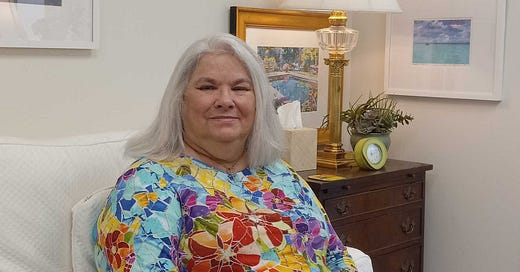Mississippi Native: Julie Liddell Whitehead
"I want to show that one can be born and raised in Mississippi, educated in Mississippi, working in Mississippi, and writing in Mississippi and be a success. It can be done."
What does it mean to call Mississippi home? Why do people choose to leave or live in this weird, wonderful, and sometimes infuriating place? Growing up in Choctaw County, Julie Liddell Whitehead strained against the limited expectations for girls and women: “There was an expectation that I’d grow up, marry a local boy, and raise me a bunch of kids. Or I might could be a teacher because I would be off school with my kids and it was a good pay for a woman. I rejected all of that wholeheartedly.” Julie now lives in Brandon, and her debut collection of short fiction, Hurricane Baby: Stories, will be published this month. Today Julie shares why she’s decided to stay in her home state and make a name for herself as a Mississippi writer.
Where are you from?
I was born at the hospital in Attala County, Mississippi but grew up from the age of three in Fentress, Mississippi, five miles west of Ackerman and two miles east of Weir. My parents still live in the same house in Choctaw County.
How long have you lived in Mississippi?
All 53 years of my life. Never lived anywhere else.
What does “home” mean to you? How does Mississippi fit into that definition?
Home is where you’re from, in my mind. It’s sometimes a different place than where we live. When I talk about “home”, I usually mean my house in Brandon. But when I say “back home,” I mean Choctaw County in the house I grew up in. Mississippi just happens to be where I’m from.
Kindness goes a long way in Mississippi in a way it might not others.
How have you cultivated community in Mississippi? Who are the people who have made you feel rooted here?
Again, for me it comes back to family. Back home, I have my parents, my sister, my cousins, my aunts and uncles. These are people who remember my daddy’s cousin Richard calling me Lucy when I was five years old. That’s going a ways back. But community here in Brandon is also focused on family. I raised three daughters here—when we talk, it’s like we read each others’ minds. We lived decades together here. Other ways include our church, our favorite waitresses at our favorite restaurants, our regular gas station attendant. Kindness goes a long way in Mississippi in a way it might not others.
Keep reading with a 7-day free trial
Subscribe to Rooted Magazine to keep reading this post and get 7 days of free access to the full post archives.




